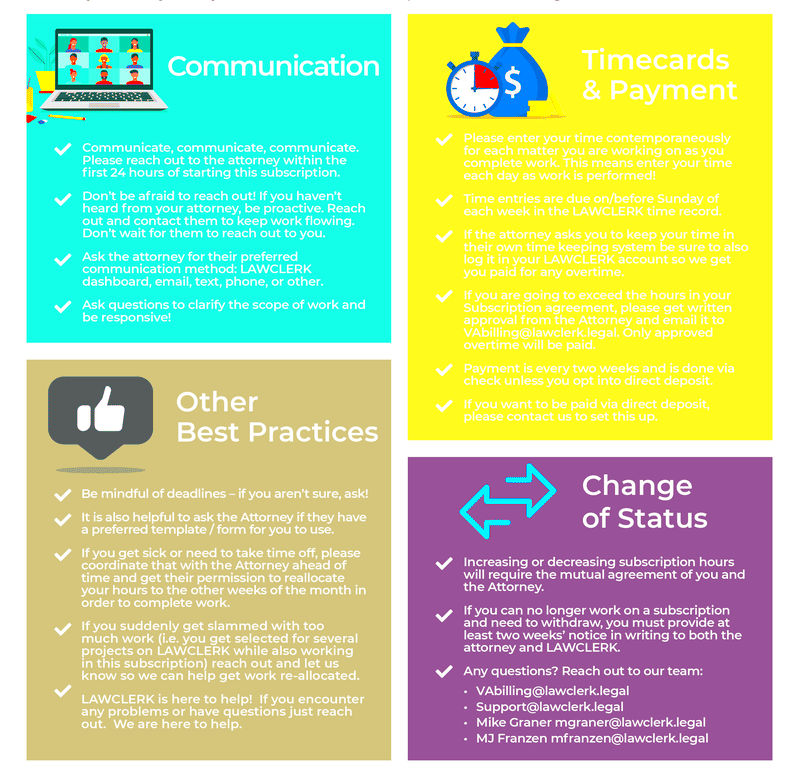Freelancing as a lawyer offers flexibility and independence while allowing you to serve clients in a way that fits your schedule. It’s an exciting path for lawyers seeking a better work-life balance, autonomy, and the opportunity to choose their own cases. Whether you're an experienced attorney or just starting out, freelancing can provide new career opportunities and ways to grow your legal practice.
Understanding the Legal Freelance Market

The legal freelance market is growing, with more businesses and individuals seeking flexible legal services. Traditional law firms are no longer the only option for clients in need of legal assistance. As a freelance lawyer, you have the chance to work with small businesses, startups, nonprofits, and even individuals who prefer more affordable and accessible legal help.
Here's a breakdown of the market opportunities:
- Small businesses: They often need legal advice but can’t afford a full-time lawyer or large firm fees.
- Startups: New businesses need help with contracts, intellectual property, and more, making freelancers a popular option.
- Individuals: Many people prefer working with a freelance lawyer for personal legal matters like estate planning or divorce.
- Online platforms: Platforms like Fiverr are growing in popularity, connecting freelancers with clients looking for legal help.
Understanding these niches and the needs of each group is crucial to finding your place in the market and standing out as a freelance lawyer.
Also Read This: Can I Get a Refund on Fiverr? Understanding the Process
How to Set Up Your Freelance Lawyer Profile

Setting up your profile is the first step in starting your freelance legal career. A strong profile shows potential clients that you’re qualified and trustworthy. Follow these steps to create an effective freelance lawyer profile:
- Choose the right platform: Decide if you want to work on freelance platforms like Fiverr or set up your own website.
- Highlight your expertise: Clearly mention your areas of law expertise, whether it's family law, contract law, or intellectual property.
- Use a professional photo: A clear, professional profile picture builds trust with clients.
- Craft a compelling bio: Write a short and engaging bio that highlights your experience, qualifications, and why clients should choose you.
- Set your pricing: Be transparent about your rates, whether it's hourly or per project. Make sure your pricing is competitive.
- Provide client testimonials: Positive feedback from clients can greatly increase your credibility. Ask previous clients for reviews or testimonials.
Once your profile is set up, focus on marketing it and connecting with clients. Your profile should reflect your skills and experience in a way that resonates with potential clients.
Also Read This: How to Extend Fiverr Order Time: A Complete Guide
Building Your Reputation and Gaining Clients

Building a strong reputation is key to attracting clients as a freelance lawyer. In the legal field, trust is crucial, so clients need to feel confident in your abilities. As a new freelancer, it may take time to build that trust, but with consistent effort, you’ll start gaining clients who appreciate your expertise.
Here are some tips to help you build your reputation:
- Provide high-quality service: Your work should always be professional, thorough, and timely. Word-of-mouth and positive reviews go a long way.
- Ask for client reviews: After successfully completing a case or project, kindly ask your clients for feedback. Positive testimonials can boost your credibility.
- Network online: Join legal forums, LinkedIn groups, or social media platforms where potential clients may be looking for legal help.
- Offer free initial consultations: Offering a free consultation can help clients feel more comfortable working with you. It’s a chance to show your expertise and establish rapport.
- Be transparent: Keep your clients informed at every stage of their legal matter. Clear communication builds trust and leads to repeat business.
Consistency is key. As you gain more clients and complete more cases, your reputation will grow, leading to more opportunities. Happy clients will often refer you to others, helping you build a strong client base over time.
Also Read This: How to Rank Your Fiverr Gig in Search: A Comprehensive Guide
Pricing Your Services as a Freelance Lawyer

Pricing your services as a freelance lawyer can be tricky. You want to remain competitive, but also ensure you’re being paid fairly for your expertise. Setting the right price depends on various factors, including your experience, the complexity of the services, and the market demand.
Here’s how to approach pricing:
- Research the market: Look at what other freelance lawyers are charging for similar services. You don’t want to undercut yourself, but you also don’t want to overprice and turn clients away.
- Choose your pricing model: You can price your services hourly, per project, or on a retainer basis. Consider what works best for the type of legal services you offer.
- Factor in your experience: If you’re a new freelance lawyer, you may want to start with lower rates to attract clients. As you gain experience and positive reviews, you can gradually increase your fees.
- Offer package deals: For certain legal services, offering bundled services at a set price can attract clients looking for value.
Be clear with your clients about your rates from the start. Having a well-defined pricing structure helps prevent misunderstandings and sets the stage for a good working relationship.
Also Read This: Pricing for Social Media Freelance Services
Managing Legal Work and Client Expectations
As a freelance lawyer, managing your workload and client expectations is essential to your success. Clients often come to you with urgent needs or complex issues, so it’s important to set realistic timelines and keep them informed throughout the process. This helps avoid frustration and ensures a smooth working relationship.
Here are some strategies for managing legal work and client expectations effectively:
- Set clear deadlines: Be upfront about how long each task will take. Factor in your schedule and the complexity of the work before promising a timeline.
- Communicate regularly: Keep your clients updated on the progress of their case. If there are delays, let them know as soon as possible and provide a new timeline.
- Be realistic about what you can handle: Don’t overpromise. Know your limits and only take on as much work as you can handle while delivering quality service.
- Establish expectations early: During the initial consultation, set clear expectations about fees, timelines, and outcomes. This avoids misunderstandings later on.
- Keep accurate records: Use tools like project management software to keep track of deadlines, client communications, and the progress of each case.
Managing both your work and client expectations is an ongoing process. By staying organized and proactive in your communication, you can build long-term relationships with clients, which leads to repeat business and referrals.
Also Read This: How to Get Payment from Fiverr in India
Common Challenges Freelance Lawyers Face
While freelancing as a lawyer can be rewarding, it also comes with its set of challenges. As a solo practitioner, you have to juggle many responsibilities, from client management to handling the administrative side of your business. Here are some common challenges freelance lawyers often face:
- Client acquisition: Finding clients can be tough, especially when you're just starting out. Building a client base takes time and effort.
- Irregular income: Unlike traditional law firms, where salaries are fixed, freelancers often face fluctuating income. Managing cash flow can be tricky when client payments come in at different times.
- Workload management: Freelance lawyers must manage their own workload and deadlines. Balancing multiple clients and cases can be overwhelming without proper planning.
- Setting rates: Determining the right price for your services can be difficult. You don't want to undersell your services, but you also want to remain competitive in the market.
- Legal risks: Freelance lawyers must navigate legal and ethical responsibilities on their own. Without the support of a law firm, it's important to stay informed about regulations and potential liabilities.
Despite these challenges, many freelance lawyers find that the benefits of freelancing—such as greater flexibility, control over their careers, and the ability to choose their clients—outweigh the difficulties. By staying organized and proactive, you can overcome these challenges and thrive in the freelance legal field.
Also Read This: How to Be a Freelancer on Fiverr
Frequently Asked Questions
As a freelance lawyer, you might have some common questions about starting and growing your practice. Here are answers to some frequently asked questions:
- How do I find clients as a freelance lawyer? Building a client base takes time. Start by networking online, using freelance platforms, and asking for referrals from previous clients or colleagues.
- How do I set my rates as a freelance lawyer? Research what other lawyers in your area of expertise are charging, and set your rates based on your experience, the complexity of the work, and market demand.
- Do I need to join a professional association? While it's not mandatory, joining a professional organization, like the American Bar Association (ABA), can provide valuable networking opportunities and increase your credibility.
- How do I manage client payments? Use invoicing tools to track payments and set clear terms with clients from the start. Consider using online platforms that offer payment processing and project management tools.
- What should I do if a client is unhappy with my work? Always maintain open communication. If a client is dissatisfied, address their concerns promptly and professionally. In some cases, you may need to offer a partial refund or other compensation.
Understanding the ins and outs of freelancing will help you build a successful practice and navigate the challenges you may encounter along the way.
Conclusion
Freelancing as a lawyer is a fantastic way to gain independence, set your own schedule, and work with a variety of clients. While it comes with challenges such as finding clients and managing workloads, the flexibility and career growth it offers make it a rewarding choice for many attorneys. By building a strong profile, setting fair rates, and effectively managing client relationships, you can establish a successful freelance legal practice.
Remember that freelancing is a journey. It may take time to grow your client base and reputation, but with consistent effort and strategic planning, you’ll be able to navigate the legal freelance world with confidence.




